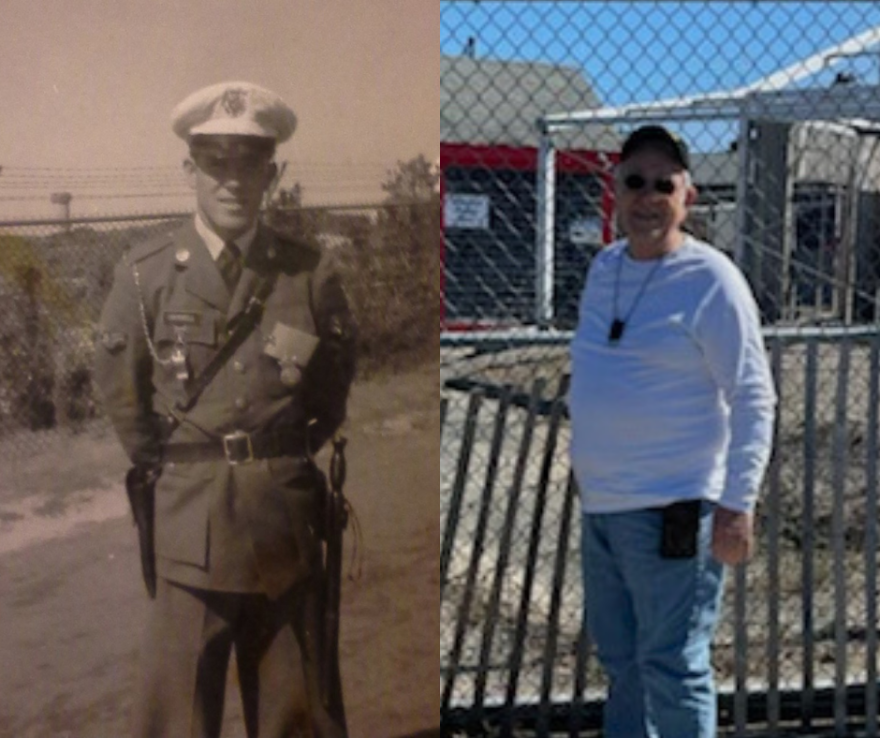He was walking across the cracked road that military wheels rolled over for decades, alone, a Vietnam War Veteran hat worn with obvious pride.
Something about the way he was coming made me detach from my small group waiting for a performance soon to begin at Payomet Performing Arts Center in Truro. “Under the Radar,” described by playwright Kevin Rice as a “historical comedy,” conjuring a time more than 50 years ago when Truro was home to the 762nd Air Force Radar Squadron.
“Good morning,” I said, because this was a 10:30 am performance.
“Morning,” he drawled. “Tell you what, I’ve been on a little vacation here on Cape Cod, hoping to do some fishing, but when I come I like to stop by and see where I served so long ago.”
“You served on the base?”
“Yessir, I did. 1962 and ’63, military police.” He pointed to a building that looked like it had been abandoned for decades — because that’s true. “I can’t tell you how many drunken servicemen I had to drag out of that club right there!”
He laughed, I laughed. “My name is Seth,” I told him.
“Well my name is Rick Cockrell, and as you can hear I’m not from around here. I’m from Waco, Texas.”
“Rick, do you know why these people are standing around?”
“No brother, can’t say I do.”
“There’s a play about to begin, the idea is that everyone is supposed to be new enlistees here at the base, and it’s 1969, and we’re getting our introductions.”
“I’ll be, now that’s an interesting concept.”
“Would you care to join me and my friends and watch? I’ll be honest, the play is intended to be funny and historical, maybe poke fun at the military a bit, so I don’t know if you’ll necessarily like it.”
“That’s real gracious of you, Seth, I’d be glad to join you.”
As we walked in Rick explained that he had shipped straight from Truro to Vietnam, the year must have been 1963 or ’64. He didn’t want to talk about that, preferring to motion to what once was a little guard shack that Payomet now uses as a ticket office.
“Almost got killed in there,” he laughed. “A new soldier hadn’t emptied his sidearm properly, and it discharged twice. Put two holes in the floor on both sides of my feet. You think those holes are still there?”
“We can look,” I said, “though I doubt it. Probably covered in plywood.”
“I agree,” he decided.
The play began and it was funny, fast-paced. I kept checking Rick out of the corner of my eye to see if he was enjoying it, or maybe insulted. At many of the historical references, humorous asides, he’d nod his head and a few times I heard him say the same thing; “That’s just about right.”
The play ended with the audience getting marched out for a few more instructions and a clear reference to where many of those 1969 soldiers were headed, where Rick had gone: The song “Vietnam” blared across the empty base.
Again I kept him in sight, wondering how he’d take it, but he was fine. Then we split off and he showed me a window in now-decrepit barracks where he slept for two years, fifth window in, second floor. We walked a bit of the perimeter like he did most nights, old posts still marking the way. We talked about socializing with people from the Cape, beers and cookouts.
It was the mundane things that remained — or at least that’s what was easier to talk about.
The guy who was going to take him charter fishing had come down with “the COVID,” so the trip got canceled and Rick was figuring he’d start back to Waco sooner than expected. His wife of more than 50 years never really liked the Cape so he had come on his own. Truth to tell, a big part of his coming was to be able to put his body in the same space he’d taken up 60 years ago, and that wasn’t about her.
He’d made the solo drive from Waco in 30-odd hours.
“That’s crazy,” I said. “How old are you?”
“I’m 77,” he drawled. “Still doing all right.”
“Why don’t you take it easy going home, string it out a few days, enjoy the scenery?”
“We just met and now you’re worrying about me?” he laughed. “I’ll be fine.”
He invoked God’s blessing multiple times, and I did the same, though that’s not something I typically say. It just seemed right.
“Tell you what, brother,” he drawled as he got in his truck, “seeing as you’re concerned, I’ll let you know when I get home.”
“I’d appreciate that,” I said.
And he did.
—
For more of Seth's writing, check out his website here.







